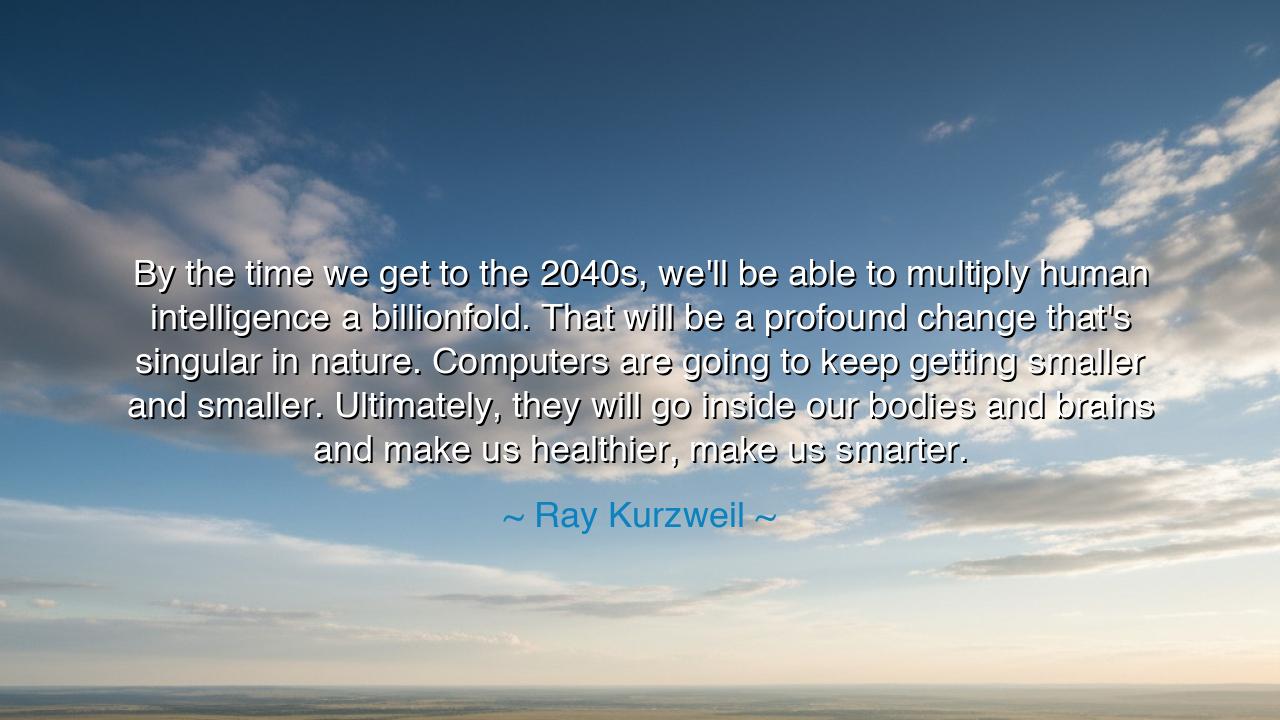
By the time we get to the 2040s, we'll be able to multiply human
By the time we get to the 2040s, we'll be able to multiply human intelligence a billionfold. That will be a profound change that's singular in nature. Computers are going to keep getting smaller and smaller. Ultimately, they will go inside our bodies and brains and make us healthier, make us smarter.






When Ray Kurzweil spoke of a future in which “by the time we get to the 2040s, we'll be able to multiply human intelligence a billionfold,” he was not predicting a simple technological advancement — he was foretelling the next evolution of consciousness. His words shimmer with both wonder and warning. Kurzweil, one of the greatest prophets of technology, envisioned a time when computers would merge with the human mind, when machines would no longer be tools, but companions, even extensions of our very souls. He called this transformation the Singularity — the moment when the boundary between man and machine dissolves, and human potential expands beyond anything the ancients could have imagined.
In his vision, intelligence itself becomes the new divine flame — the fire of Prometheus, reborn in circuits and neurons. The computer, once vast and distant, will grow smaller, more intimate, until it lives within us, flowing through the same veins that carry our blood. Kurzweil saw this not as invasion, but as union: the fusion of human spirit and artificial reason. The tools we once built to serve us will soon enhance us — making us healthier, smarter, and stronger, granting us lifespans and capacities that border on the immortal. Yet in this promise lies the echo of the oldest question: what happens when man takes creation into his own hands?
To understand Kurzweil’s prophecy, one must recall the pattern of all human progress. When Gutenberg created the printing press, he multiplied the voice of the human mind a thousandfold, setting knowledge free from the chains of parchment. When the Industrial Revolution dawned, machines multiplied human muscle a thousandfold, changing the face of labor and civilization. Now, in the coming age of artificial intelligence, Kurzweil foretells the next revolution — the multiplication of the mind itself. In his eyes, the 2040s will not simply mark a technological milestone; they will mark the dawn of a new species — one that blends flesh and code, intuition and calculation, biology and logic.
Yet every leap toward the divine carries peril. The myth of Icarus warns us that in our hunger for light, we may forget the limits of the human frame. The same technologies that promise to heal could also enslave; the same intelligence that augments us could one day surpass us. Kurzweil’s prophecy, then, is both a hymn and a challenge. He calls us to embrace knowledge without surrendering our humanity, to walk the narrow bridge between power and wisdom. It is not enough to make ourselves smarter; we must make ourselves wiser. For intelligence without conscience is lightning without a shepherd — brilliant, but destructive.
We have already begun to glimpse the truth of his words. In our era, artificial intelligence learns, writes, paints, diagnoses, and speaks. Medical nanotechnology begins to heal from within. Our devices anticipate our needs before we speak them. The computer is no longer outside us — it lives beside us, in our hands, our homes, our pockets. The distance between thought and action has never been smaller. Each generation moves closer to the merging of mind and machine. What Kurzweil foresaw as the 2040s may already be stirring beneath our fingertips.
And yet, amid all this brilliance, we must remember what cannot be coded — the soul. The machines may amplify intelligence, but not compassion; they may map emotions, but not create empathy. They will carry our logic, but not our longing. Kurzweil’s vision reminds us that the truest measure of the human spirit lies not in how fast we think, but in how deeply we feel. As we move toward this new age, we must preserve the light that makes us human — love, art, courage, humility — for those are the elements no algorithm can replicate.
The lesson, then, is one of balance and awakening. Prepare for the coming dawn not with fear, but with mindfulness. Let technology serve as a mirror to our divinity, not a replacement for it. The ancients sought enlightenment through meditation; the moderns may find it through machines — but both paths lead to the same truth: that awareness itself is sacred.
Practical actions for the seeker of wisdom in the age of machines:
-
Use technology as a tool for growth, not escape — let it extend your vision, not replace your thought.
-
Seek wisdom alongside knowledge; study the heart as diligently as the mind.
-
Remember that progress is only holy when guided by compassion and humility.
-
Engage with the digital world consciously — shape it with ethics, empathy, and reverence for life.
For as Kurzweil foretells, a billionfold intelligence awaits us. But whether that future is a garden or a labyrinth depends on the soul that commands it. The fusion of man and machine will not destroy humanity — unless we forget that the spark within us is older, wiser, and more powerful than any circuit ever built.






AAdministratorAdministrator
Welcome, honored guests. Please leave a comment, we will respond soon